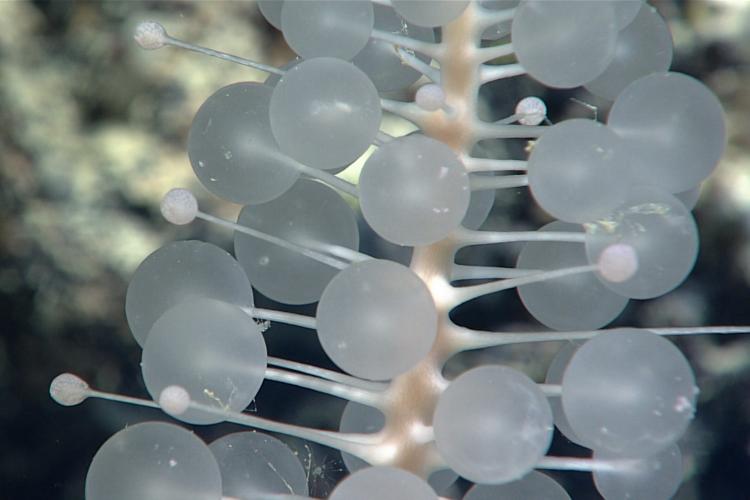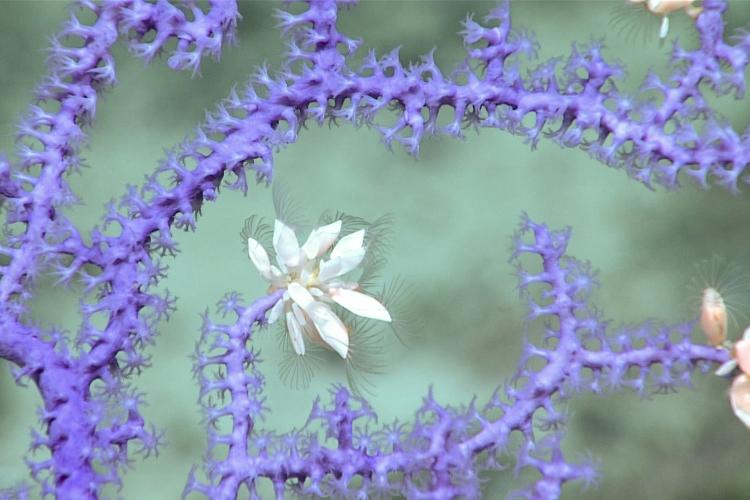The deep sea is the largest habitat on Earth, and the least well known. NOAA’s Deep-Sea Coral Research and Technology Program has significantly improved its understanding of deep-sea coral communities.
The 2022 Deep-Sea Coral Report to Congress (PDF, 18 pages), showcases new accomplishments and scientific discoveries and summarizes exciting activities from 2020 and 2021.
Improving Understanding of Deep-Sea Coral Communities
Deep-sea corals create habitat for countless species off of every coastal state in the country. They offer significant ecological value and support a number of U.S.-managed fishery species. These productive habitats provide spawning grounds for commercially important fish such as grouper, snapper, sea bass, and rockfish, as well as shrimp and crab. The high biodiversity of deep-sea coral and sponge habitats has made them fertile ground for new species and new natural product discoveries.
 A close look at a large carnivorous sponge (nicknamed the “ping-pong” sponge) south of the Florida Keys. (Photo credit: NOAA Ocean Exploration)
A close look at a large carnivorous sponge (nicknamed the “ping-pong” sponge) south of the Florida Keys. (Photo credit: NOAA Ocean Exploration)
We supported large-scale underwater surveys of deep-sea coral communities in West Coast waters and smaller scale efforts in most regions of the country. As a result, NOAA and our partners:
- Described 15 new deep-sea coral and sponge species
- Mapped 50,000 square miles (approximately the size of Louisiana) of previously poorly understood seafloor in high resolution
- Completed a 4-year research initiative on the West Coast, including two 30-day keystone cruises through the Expanding Pacific Research and Exploration of Submerged Systems campaign
- Implemented three fishery management councils’ proposed regulations, resulting in more than 160,000 square miles of new seafloor protections and the reopening of 3,000 square miles of less vulnerable habitat for fishing
Supporting Management Decisions
The Program’s cutting edge and collaborative research informed critical management decisions about deep-sea coral habitats. Our data informed deep-sea coral habitat conservation regulations created by the Pacific, New England, and Gulf of Mexico Fishery Management Councils in 2020 and 2021. These new fishing regulations increase protection for a significant area of seafloor habitats—most designed explicitly to protect deep-sea corals—and reopened less vulnerable habitat to fishing. In addition, our data informed the almost three-fold expansion of Flower Garden Banks National Marine Sanctuary.
Managers in every region of the country have now used our discoveries and scientific findings. They use our information to make informed decisions about fishing regulations, protected area boundaries, aquaculture planning, precious coral harvest management, and more.
Advancing Science and Understanding Through Partnerships
The Program works with partners and leverages complementary areas of expertise and resources to pursue joint priorities. The shared vision and investment with partners enables us to advance the state of deep-sea science and better understand these complex ecosystems. By working with partners, we move beyond simply locating unknown deep-sea corals. We collaborate to better understand genetic identification, ageing, damage and recovery assessment, population connectivity, and habitat prediction.
 Scientists observed this unusual purple deep-sea coral during an expedition in U.S. Northeast waters. (Photo credit: NOAA Ocean Exploration)
Scientists observed this unusual purple deep-sea coral during an expedition in U.S. Northeast waters. (Photo credit: NOAA Ocean Exploration)
The Program and its partners are committed to continuing research activities that improve our understanding of deep-sea coral communities. We aid resource managers in developing and evaluating management options for these valuable habitats on which U.S. fisheries and communities depend.



